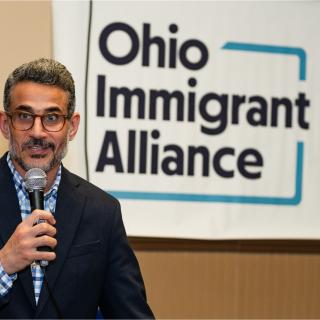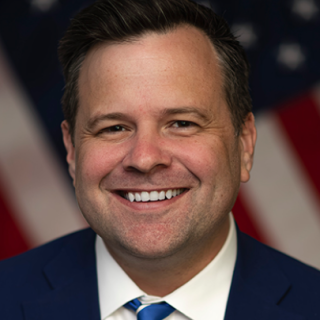Catch up with Simply Living’s founding member Chuck Lynd — a lifelong advocate for local economies, sustainability, and the power of community to shape a just future.
The Early YearsFew people embody Simply Living’s mission as fully as Chuck Lynd — longtime board member, community organizer, and local economy advocate. Chuck’s journey from small-town Ohio to the frontlines of social and environmental change offers a model of what it means to “live simply so that others may simply live.”
“I was very lucky to grow up in a loving family in Ironton, a small town on the Ohio River. My parents grew up during the depression and my brother and sister and I were all born during WWII, while my dad worked double shifts at Armco Steel. Later my dad owned the Ironton Book Store, which also sold office supplies, typewriters, gifts and dishware. From age 11 though high school I worked at the store and learned everything about running a retail store, and even kept the books. This experience gave me a good work ethic and influenced my love of local economics and my involvement in helping start the Clintonville Community Market.”
That early grounding in small-town community life would later inspire Chuck’s commitment to supporting local business, cooperative economics, and Simply Living’s incubation of other organizations in Central Ohio.
Social Justice at AntiochChuck’s path toward activism began when he attended Antioch College in 1962 — a journey that began, remarkably, when his father discovered an article in Playboy Magazine.
“Antioch had a strong commitment to social justice,” he says. “There’s an obelisk on campus that quotes founder Horace Mann: ‘Be ashamed to die until you have won some victory for humanity.’”
That quote became a guiding principle in Chuck’s life. During his time at Antioch, Chuck took part in co-op work experiences across the country — from teaching in Harlem, NY to protesting for racial justice in Phoenix during the 1963 March on Washington. He later demonstrated against the Vietnam War in 1967 and, years later, was arrested in Washington, D.C., protesting the Tar Sands pipeline after being inspired by Bill McKibben.
 Chuck Lynd, age 21, as a student at Antioch College. Photo courtesy of Chuck Lynd.The Birth of Simply Living
Chuck Lynd, age 21, as a student at Antioch College. Photo courtesy of Chuck Lynd.The Birth of Simply LivingIn 1991, Chuck met Marilyn Welker, who had been inspired by the 20th anniversary celebration of Earth Day that drew 20,000 people to Whetstone Park.
“Marilyn saw that the time had come for Americans to make lifestyle changes and scale back the excesses of consumer culture,” Chuck remembers. “As Jim Coe liked to say, we were dreamers as well as doers.”
By 1992, Simply Living was born. In the early years, the group grew quickly through collaborations with other environmental organizations and the creation of the Clintonville Community Market.
“When the Market opened, our membership quadrupled to nearly 1,000,” Chuck says. “We even started a bookstore and hosted weekend events — music, poetry, flea markets — that added to the fun and attracted many new people.”
 The Clintonville Community Market opened in 1996-97.
The Clintonville Community Market opened in 1996-97.Photo courtesy of Sheila Fox.A Local Movement Grows
As Simply Living matured, so did its influence. Chuck helped organize film screenings, sustainability meetups, potlucks, and community groups across Central Ohio — connecting local businesses, neighborhoods, and environmental leaders.
A Vision for Localization“Our community kept growing,” he says. “Sustainability groups formed in Clintonville, Worthington, Westerville, Bexley, Grandview, Delaware — all across the area. I was personally involved in promoting our growth and evolution.”
Among Chuck’s many passions, localization stands out as a driving force.
“Localization is a solutions multiplier,” he explains. “I helped get a grant to start a Columbus coalition affiliated with the Business Alliance for Local Living Economies. Our Support Ohio Local Economies (SOLE) project showed that a 10% shift in spending from chains to local businesses in Franklin County could retain $312 million — enough to create 5,000 well paying jobs.”
Chuck connects local spending with everything from food systems and renewable energy to community finance and resilient economies.
“…dollars that would have been spent to out of state vendors and Wall Street investors helps to reduce the negative impacts caused by the global consumer economy. Similarly, localizing our food system will create better health outcomes than the global, commodity food system that relies on pesticides and herbicides and monoculture crops that reduce soil quality. Localizing energy distribution with solar panels, wind turbines, and geothermal systems combined with microgrid technologies will dramatically improve the grid and energy efficiency. Localizing the financial system by moving our money from global banks to community banks and credit unions will expand local investment in entrepreneurial enterprises.”
 Simply Living’s Little Library inside of the Clintonville Community Market. Photo courtesy of Sheila Fox.Small Choices Enable Us To Be The Change
Simply Living’s Little Library inside of the Clintonville Community Market. Photo courtesy of Sheila Fox.Small Choices Enable Us To Be The ChangeChuck believes that personal choices and collective action are deeply intertwined.
Why Community Matters“Many people think personal lifestyle changes don’t matter,” he says. “But when enough people challenge the status quo, social change happens. That’s true of all the bottom up movements – civil rights, environmental protection, women’s rights, multiculturalism, etc. We are seeing examples of this now. When Target ended DEI programs, consumers boycotted resulting in their stock dipping by 40%. When ABC canceled Jimmy Kimmel – and consumers canceled their Disney and Hulu subscriptions – ABC was left with no choice but to bring Jimmy back on air. Research shows it doesn’t take a majority — only about 10–15% of early adopters can begin to shift systems.”
 Chuck speaking at a Simply Living fundraiser in the early 2000’s. Photo courtesy of Sheila Fox.
Chuck speaking at a Simply Living fundraiser in the early 2000’s. Photo courtesy of Sheila Fox.Hope in the Next Generation“I believe community is more important than ever since so much of communication is electronic, and no longer “IRL” meaning In Real Life. Humans are born into the community of family and a sense of belonging and being valued is essential to our mental and physical health. Any community is helpful, but communities that share the values of living simply and authentically are the ideal.”
Despite the challenges of climate change, inequality, and polarization, Chuck remains hopeful.
Staying Grounded in Uncertain Times“Young people are waking up and for all the concern about harmful social media algorithms and too much screen time, I see a keen awareness of systemic problems – climate change, income inequality, money in politics – but the natural idealism of youth feels up to the challenges. I see this in my own children and grandchildren, and we all have much more strength in adversity than we imagine. When disasters happen, people respond with courage and cooperation.”
“I step back and look at the big picture, the “context” for the uncertainty. Terrible things are shaking the foundations of our democracy, economy, climate change, wars, etc. Evolution tells me that whatever changes are “going down” there are emerging responses to address the problems. I see the No Kings protests of ordinary people taking to their kitchens to make signs and stand up for freedom and democracy, and finding strength with their neighbors. I see the failure of neoliberal economics but I recognize the need for the failure and see the emergence of social enterprises, the transition from shareholder value to recognizing community and employee stakeholders. I see the failure of proxy wars and the emergence of diplomacy and the need to reform and strengthen the United Nations.”
 Simply Living Co-Founder Chuck Lynd. Photo courtesy of Chuck Lynd.Dreams for the Future
Simply Living Co-Founder Chuck Lynd. Photo courtesy of Chuck Lynd.Dreams for the FuturePassing the Torch“I dream that Simply Living will be a model for communities everywhere.” Chuck says, “Similar organizations are happening in Cincinnati, Oberlin, Yellow Springs, Marion, Delaware et al in Ohio. Nationally, the movements for sustainability and regeneration are happening in Reno, NV, Ithaca, NY Eugene, OR, Boulder, CO, et al. As early adopters show the way, the speed of change will accelerate.”
Simply Living Is Important Because…“There are many ways to foster change, but we all need to find our passion and help bring about the emergence of new systems to supplant the old ones – e.g., local organic farming to supplant the unsustainable industrial food system. The Story of Stuff project, founded by Annie Leonard, created an excellent quiz to help anyone discover the type of changemaker that suits them best.”
Check it out: The Changemaker Quiz
His Journey Continues“… living simply and authentically is not only wise, it is the key to solving the climate crisis. Many people do not understand that transitioning away from fossil fuels to renewable energy, while certainly important and worthwhile, is a symptom of a deeper problem of consumer culture. It is the demand for more and more that drives the economy to destroy ecosystems – desperate search for fossil fuels like fracking, but also deforestation for logging, cattle grazing, and commodity agriculture; dumping and overfishing that are disrupting ocean ecologies; industrial/chemical agriculture depleting our soils; plus air travel, cruises, data centers stealing our water, etc. We are already living in the sixth great extinction of life forms on earth, this time human caused. CO2 from fossil fuels drive global warming but the demands of consumer culture fuel the economy. By consuming less, living local, and co-creating regenerative communities rooted in living simply and joyfully on the earth, we fulfill the vision of Simply Living.”
Chuck Lynd’s story reminds us of our influence as changemakers — and that one person’s lifelong commitment to justice, sustainability, and localism can spark movements that ripple through people, organizations, and communities across time.



